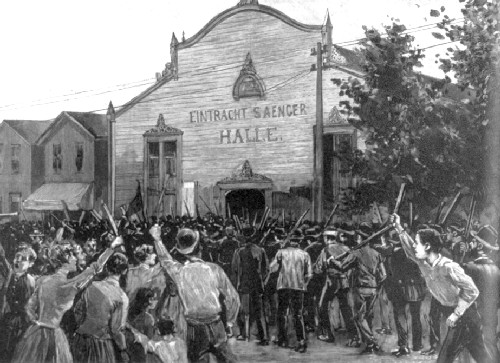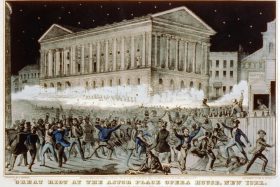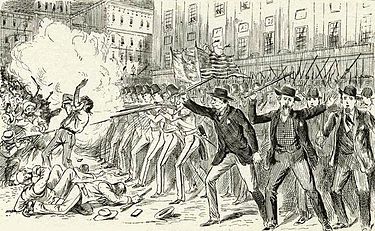 The Homestead Riot of 1892 was a watershed event in American business history. At the Homestead Steel Works near Pittsburgh, Pennsylvania, union leaders and workers rejected wage cuts proposed by owner Andrew Carnegie and plant manager Henry Frick. Negotiations failed, a strike began, the plant was closed, workers armed themselves, Pinkerton security forces were called in, and a battle ensued. The result? Three Pinkertons and nine workers killed.
The Homestead Riot of 1892 was a watershed event in American business history. At the Homestead Steel Works near Pittsburgh, Pennsylvania, union leaders and workers rejected wage cuts proposed by owner Andrew Carnegie and plant manager Henry Frick. Negotiations failed, a strike began, the plant was closed, workers armed themselves, Pinkerton security forces were called in, and a battle ensued. The result? Three Pinkertons and nine workers killed.
 But did you also know about the Astor Place Opera House Riot in 1849? Angry New York factions clashed over the proper interpretation of William Shakespeare’s Macbeth. One side preferred the “ruggedly masculine” and “forceful acting style” of Edwin Forrest, and the other advocated the “more restrained” approach of William Macready. Critics pronounced, insults were slung, tempers flared, one night the crowd went wild, and the state militia was called in. Result? Twenty-two people killed.
But did you also know about the Astor Place Opera House Riot in 1849? Angry New York factions clashed over the proper interpretation of William Shakespeare’s Macbeth. One side preferred the “ruggedly masculine” and “forceful acting style” of Edwin Forrest, and the other advocated the “more restrained” approach of William Macready. Critics pronounced, insults were slung, tempers flared, one night the crowd went wild, and the state militia was called in. Result? Twenty-two people killed.
So: Twelve versus twenty-two killed. Impressive times when riots over Shakespeare could be more deadly than riots over money.
[Updated from this 2011 post at StephenHicks.org.]
